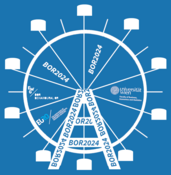univie: summer school Behavioural Operations Research 2024
The EURO Working Group on Behavioural OR (EWG-BOR) is organising a EURO PhD School in Vienna, September 16th–20th, 2024 funded by The Association for European OR Societies (EURO) and EWG-BOR.
EWG-BOR was established in January 2017 as a platform for academics, teachers and practitioners interested in behavioural OR (BOR). Behavioral Operations research (BOR) studies how human behaviour, cognition and emotions affects, and is affected by, OR-related activity, and how to use this understanding to improve OR practice and education. This is a new emerging area in OR which is receiving growing interest. The main activities of EWG-BOR include the organization of dedicated streams in EURO and IFORS conferences, workshops, PhD schools, as well as a regular online seminar series. To date, these activities have been extremely well attended.
The summer school is a great opportunity to learn about BOR concepts and the different ways to conduct BOR studies. It will bring together international students and researchers with different backgrounds and research interests, fostering interdisciplinarity and networking. Previous summer schools on BOR (see e.g. http://bor.aalto.fi/summerschool.html) have been very successful and people have made valuable contacts there.
The univie: summer school Behavioural Operations Research 2024 will offer participants the opportunity to learn about BOR concepts and the different ways to conduct BOR studies. It will bring together researchers with different expertise and research interests, fostering interdisciplinarity and networking opportunities that are particularly valuable for young scholars. In addition, participants will receive 5 ECTS credits for successful completion of the summer school.
Topics
Behavioral decision making
Human decision making is subject to various biases that cause deviations from the concepts of rational decisions as formulated e.g. in expected utility theory. In this part of the summer school, we will review the most important bias phenomena that have bee identified in research. Starting from the prescriptive perspective of utility theory, we identify how these biases violate the axioms of rational decision making. We then review empirical research that indicates how they can be detected and how frequently they occur. Finally, we will consider methods to counterbalance the bias phenomena. Small in-class experiments will allow participants to test to the rationality of their own decision making.
Decision neuroscience
Decision neuroscience studies are contextualized within behavioral decision making in the sense that biases and deviations from the rational choices can be investigated using neuroscience tools in the behavioral experiments. An overview and description of the main communities in this topic will be considered, including neuroeconomics and their focus on expected utility theory and decision under risk. The presentation includes a brief description of the main tools applied in Decision neuroscience. Then, a few experiments and their results are presented with focus on modulating decision making methods and their decision support systems.
Stakeholder involvement and large groups
Public policy and environmental decisions are typically complex, because many people with different interests are potentially involved in, or affected by the outcome. Such decisions can be addressed with Multi-Criteria Decision Analysis (MCDA), understood as a methodology that encompasses different methods such as problem structuring (e.g., stakeholder analysis, brainstorming objectives and options), preference elicitation (e.g., weights, value functions), MCDA modelling, and uncertainty analyses. In such settings, stakeholders typically participate in large workshops, or with (online) surveys; but the rigorous use of MCDA remains a challenge. After introducing a stepwise approach to Multi-Attribute Value Theory (MAVT), including uncertainty, I will focus on behavioral challenges and some results from recent quasi-experimental approaches. Participants will have the opportunity to participate in preference elicitation using different approaches and implement the elicited preferences into our software ValueDecisions to calculate MCDA. We will shortly discuss and compare the approaches .
Group facilitation
Facilitation is helping a group (hereafter referred to as team) in making a decision, by attending to procedure and process. Facilitation starts with designing a decision support intervention. Choices such as the scope of the problem, roles of the analyst and team members, who will be involved, the environment and approach to sharing and combining information drive the design of an intervention. While these choices set the stage, much of the skill of facilitation involves steering the ongoing interaction of a team. Regardless of the particular approach or method chosen, teams will always need to share ideas, converge information into categories or a model, and prioritize between options. While exchanging information is the more visible part of team interaction, decision making is also about the undercurrent of conflicts and emotions. A facilitator can take particular actions to increase or decrease the level of conflict, work towards agreed upon group products and arrive at solutions that the team commits to.

